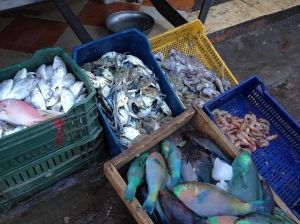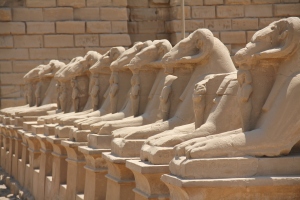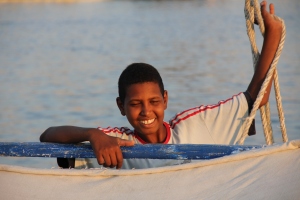I returned from Egypt two days ago (this post was written two years ago ) , and by the number of visits I pay to the bathroom , one can tell. Egypt is not a country for beginners. Unless you fancy an all-inclusive deal in one of the thousand resorts along the Red Sea coastline, visiting Egypt is a real challenge.
I accepted the invitation from an Egyptian friend living in Brussels to visit him in Luxor on the occasion of his brother’s wedding . I had been to Egypt many many years ago, on an organised cruise on the Nile. Except for remembering the pyramids in Gizah, overcharged buses in an overcrowded Cairo, or the poorest amongst society owning a TV, little do I remember of the rest of this trip. I got sick with diarrhea on the boat, and recall I could not visit Luxor then. 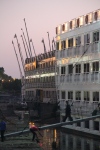

The wedding would be in Luxor, but I found myself a cheap flight to Hurghada. Known as the ‘paradise of Egypt’, Hurghada is blessed with miles and miles of sandy beaches facing the red sea. Looking at my fellow passengers on the plane I considered myself lucky not going to be stuck in one of the hundred resorts lining the Hurghada coast.
I love to discover a place through a local’s eye, and to my pleasant surprise, Khaled, a friend of a friend would be my ideal host on this trip.
On my first day I went diving. With only 5 ‘tourists’ on board, we took off to a first reef. An experienced diving instructor guided us one by one , leading us through the marvelous colorful sea life. One of my fellow members on the boat refused the second dive in the afternoon. Granted, diving is as tiring as having been on a plane. While descending in the water, I could feel the increasing pain in my ears. But that pain would go away, and with the pain also the fear my head would explode.
Dinner could be anything but fish that night! Khaled came to fetch me from my hotel to take me to a lovely fish restaurant right opposite the main mosque and the early morning fish market in Hurghada. On the left of the entrance stands an open freezer with the selection of the day to choose from. The place looks expensive, for it is clean and tastefully decorated, but equally nice as the excellent fish soup, the stuffed grilled talapia, the whole wheat rice and salads, came the bill. For a meal we could hardly finish the two of us, I paid less then 10 €. I admit, we had no alcohol, for most restaurants do not serve any. And yes, the water comes in plastic cups. And true as well, service is a bit chaotic. But where else can you eat this quality for such little money!
The next day, my alarm goes off at 7 as we have to catch the local's 8 o’clock bus for Luxor. The bus station is nothing more than a run down, dusty bar with local Egyptians smoking what must be their first chicha of the day. Few carry pc’s and i-phones or i-pads which are unseen here. 8:30 h passes and there is no sign of the bus yet. Rumors have it that in view of the difficulty to find petrol, the bus might not even show up at all and we might have to find a private driver. In an effort to undermine the new regime, those in favor of the past aim at artificially creating a scarcity of fuel, hoping people might wish for the return of the situation as it was before the arabic spring.
An italian woman married to a young Egyptian, a japanese-corean and I are the only foreigners on the bus. The bus is comfy, relatively clean and air conditioned. For what is supposed to be a 4-hour journey I pay 82 egyptian pounds ( 11,3 € ) per person. We stop at several check-points on the way, but at one, the stop takes for ever. A custom agent enters the bus to apologize for the delay. Our driver seems to be under the influence of some illegal tablets he’d been taking, and we do not know yet if the same driver will be allowed to continue the journey. This is Egypt, but Khaled seems to be happy with the custom agents having returned to their jobs. Ever since the Revolution, security has been a big problem with police practically being on strike. But when Khaled tells me a few days later the control for hygiene had shown up in a hotel only three days after he had filed a complaint, he is convinced life in Egypt is back to normal.
We arrive in Luxor in the midst of the day with a local taxi waiting for us to take us to the hostel. Sayed who is married to a Belgian woman, runs the Sherif hotel ( Bob Marley Guesthouse ), hidden away in an alley of Television street. I cannot remember when was the last time I stayed in a 80 pounds ( 10,66 € ) room. But great is my relieve to find a clean room with working airco. Khaled’s room is half price, and has no airco but a fan. And even for an egyptian the heat in Luxor can become unbearable.
Lunch ordered to the hostel is an egyptian specialty. Koushary is a mixture of short pasta with lentils, and the spicy sauce is optional. After a short but well deserved nap we decide to visit the Luxor temple, less then a 5-minute walk away. The temple is already closed, but we are happy with the view from the outside.
It is still very hot while we walk around the temple, stroll through the local soukh. The battery of my i-phone has meanwhile died on me, but I am pleasantly surprised to find a battery for my canon EOS camera, having stupidly forgotten mine in my bathroom back in Brussels. I want to celebrate I can finally use my camera, we take a caleche through the city in our search to find a nice, dust-free bar. The metal foot-plate to step into the caleche feels a bit shaky, but the ride is a pleasant change from the old shabby cab cars. Caleche drivers are fellaheen, local peasants who come to town to make some money. I see many of them, but few are occupied. Tourism in Egypt has not recovered yet from the Arabic Spring, and the tens of anchored cruise ships along the shore are merely another prove of this.
Khaled also has another explanation . Tourists stay away from Luxor because of its dusty, dirty streets, the noise and danger coming from speedy cars and motorbikes. And for me, if there was one, the lack of hygiene. Clean running water is non-existant, and their definition of hygiene stands miles apart from what I am used to in Europe. I so much enjoyed the freshly squeezed sugarcane juice, though suspicious about the glass while drinking it.
We find a nice clean bar with the help of our caleche driver. Inside only men, the TV too loud and the air conditioning too cold. We decide to stay and I am craving for something sweet. I suggest Khaled teaches me how to play Backgammon while he is smoking chicha. I am the happiest woman on this planet when he delivers me a semi-sweet coconut cream topped with sliced apples and chopped nuts. It tastes delicious. While giving me the first rules of the game, he checks on his chicha to make sure the charcoal stays in place. The game sounds complicated at first, but once I get the basics, I enter into competition mood. Backgammon is originally a persian game, one of the oldest table games known, yet so popular in Egypt one would forget it was not invented here. When Egyptians like something, they so much make it part of their own identity. Egyptian men ( and few women) seem to be born with a chicha ( also shisha ) pipe in their mouth. Though the World Health Organisation has warned that chicha is potentially more dangerous than cigarettes because users take more puffs of smoke, Egyptians seem not to worry about their health. For them, it is a social event, and the price for smoking one pipe is so low it is available to all.
We finish the evening in a local restaurant, too small too cook the food in there. We order stuffed pigeon, grilled chicken, hummous ( “the best I ever had” Khaled ), rice, spicy vegetables and a small salad. Though Khaled’s pigeon is not daily fresh, my chicken is juicy and tender. And again our bill is less then 7 € .
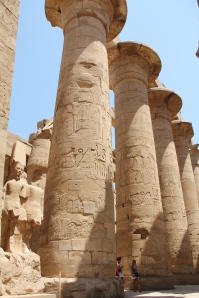 The sun is burning over our heads when we leave the Sherif next morning for a visit to the Karnak Temple. Though within walking distance from our hotel, we opt for a cheap cab to bring us there. I am surprised to see how few tourists there are. No buses on the parking lot, no lines of tourists at the ticket boot. Dedicated to the Theben triad of Amut, Mut and Khonsu, the Karnak temple complex is one of the largest religious buildings in the world and best known for its hypostyle hall of 134 columns. As we are not in a hurry, we sit, we stroll and wonder and I enjoy taking lots of pictures.
The sun is burning over our heads when we leave the Sherif next morning for a visit to the Karnak Temple. Though within walking distance from our hotel, we opt for a cheap cab to bring us there. I am surprised to see how few tourists there are. No buses on the parking lot, no lines of tourists at the ticket boot. Dedicated to the Theben triad of Amut, Mut and Khonsu, the Karnak temple complex is one of the largest religious buildings in the world and best known for its hypostyle hall of 134 columns. As we are not in a hurry, we sit, we stroll and wonder and I enjoy taking lots of pictures.
It is almost 3 pm when we arrive back to the hotel for a refreshing nap and a fast lunch. An older Syrian couple who just fled their hometown Homs is preparing lunch. They don’t talk much, – maybe the result of the horror they escaped from, – but we learn they had to leave their twelve children behind on their way to Turkey. Afraid he might loose his few belongings, the man carries his briefcase with every step he takes.
If we want to make it for sunset , we soon have to leave for the fellucca ride on the Nile Khaled has booked us. He knows everyone in Luxor and for 70 pounds ( 9,3$ ) we are the only two passengers on the fellucca. Made obsolete by motorboats and ferries, these traditional sailboats are still very much in active use as a means of transport on the Nile. We tremendously enjoy the relaxing and refreshing ride, far away from the Luxor dust and heat. I do not know where to look first, the farmers ploughing the green West bank shore, the sun setting down on our fellucca, the cruise ships waiting for customers… I am only saddened when I notice the thin oil layer on the water. Birds and fish still survive, but for how long?
Our last full day in Luxor is reserved for a visit to the Valleys. At 8 am sharp we meet our driver to take us to the west bank and the Valley of Kings as a start. Same situation here, there are not enough tourists to fill the 5 tuf-tufs that take you from the entrance to the site of the tombs. Here for a period of 500 years between the 16th till the 11th century BC, tombs were constructed for the Pharaohs and powerful nobles of the New Kingdom. Today 63 tombs and chambers have been found. The royal tombs are decorated with scenes from Egyptian mythology and give clues to the beliefs and funerary rituals of the period. We decide to visit two, and as no pictures are allowed, I have my full attention to admire the beautiful drawings, most of them extremely well preserved. Most of these tombs have been robbed and found empty, except for one, the tomb of Tutankhamun. Open to the public but at an extra charge of 100 pounds ( 25 pounds for Egyptians ), we hesitate at first. With my fascination for Tutankhamun ever since I was a child and not knowing when I will be back here, I convince Khaled. We follow one of the two tomb guides down a steep, long staircase to enter the first chamber. I am shocked to see the black mummy is in there and fear I am intruding someone’s privacy. Khaled reminds me of the curse and I start feeling uncomfortable. In the only other equally small chamber on the right , stands the sarcophagus made of granite .
Contrary to his status Tutankhamun’s tomb is relatively small. As the pharaoh died unexpectedly at 18 years old, a tomb meant for someone else was most likely used in order to respect the customary 70 days between death and burial. I just missed the exhibition in Paris where every object found in his tomb was on display exactly as when Carter found them on November 4th 1922. But the book by the same name as the exhibition ” Tutankhamon, his tomb and his tresors” by I.E.S. Edwards, though published back in 1977, is marvelously complete.
We return to the entrance where our driver is waiting for us. Few shops selling souvenirs are open, and sellers are less aggressive then I remember them from 25 years ago. We leave the valley and stop for shisha and coffee on the way. We stop at a bar right opposite the Ramses III temple. I am anxious to visit an alabaster factory , but our first next is the Valley of the Queens. Though interesting, this part is far less exciting as the Valley of the Kings.
We return the following morning before sunrise to make a ballon flight over the Valley of The Kings and Queens. I am speechless from the first till the very last minute of this flight. The view is breathtaking, and one can only marvel about the wonders these ancient Egyptians built.
My visit to Egypt is too short, and the list of things to see & do too long. Beautiful Egypt, one day I will be back.
We return the following morning before sunrise to make a ballon flight over the Valley of The Kings and Queens. I am speechless from the first till the very last minute of this flight. The view is breathtaking, and one can only marvel about the wonders these ancient Egyptians built.
My visit to Egypt is too short, and the list of things to see & do too long. Beautiful Egypt, one day I will be back.



